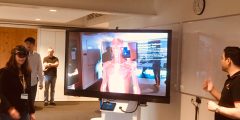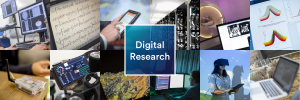Using Julia on the HPC
September 30, 2022
In this blog, we explore the speed and efficiency of using the programming language Julia on the University’s high-performance computer. This blog has been guest-authored by Jamie Mair, a PhD researcher in the School of Physics and Astronomy. The repository for the code given below, which was presented at this year’s annual UoN HPC conference, …
Introducing Trusted Research Environments
May 31, 2022
The UoN Trusted Research Environment (TRE) Service is now live. The University of Nottingham’s pioneering Trusted Research Environment (TRE) platform is now live, enhancing the University’s research capabilities. Hosted by Digital and Technology Services (DTS) in Microsoft Azure, the secure data platform is available to researchers, partnered institutions and trusted organisations working with highly sensitive …
HoloLens 2 and research
May 27, 2022
This week, we trialled HoloLens 2 technology with colleagues from the School of Life Sciences, the Biodiscovery Institute, the School of Education, the Nanoscale & Microscale Research Centre, and the Hounsfield Facility. The workshop was led by InterReality Labs, with support from Microsoft. The HoloLens 2 is an untethered, wearable device that can project holographic …
Approaches to tracking impact
April 25, 2022
In this blog, we consider approaches to tracking research impact, with a focus on digital tools. We will outline reasons for gathering evidence of impact, what tools you might need to do this, and how digital approaches can help. In short: how can you gather material to show the positive societal change that your work …
Archiving a website
April 22, 2022
In this guide, we show you how to download and package a website for archiving. If you have produced a website for your research project, you may wish to archive it (or be obliged by your funder to do so). Here, we show you how to do two things: (a) convert a website to a …







Recent Comments